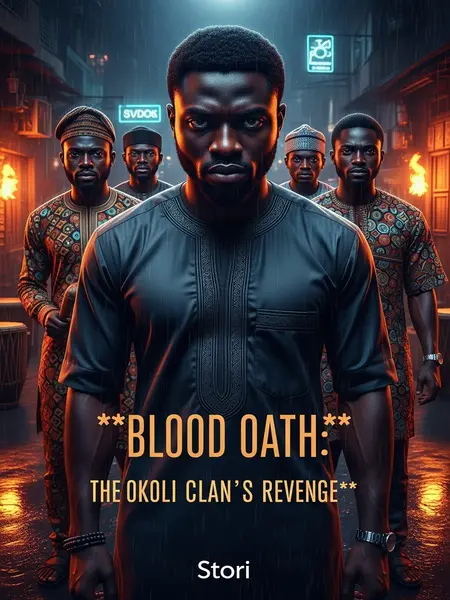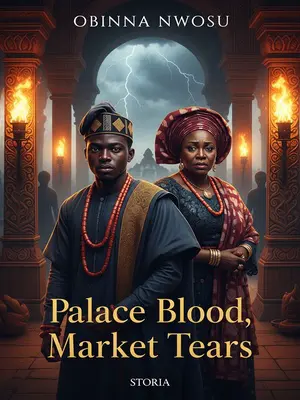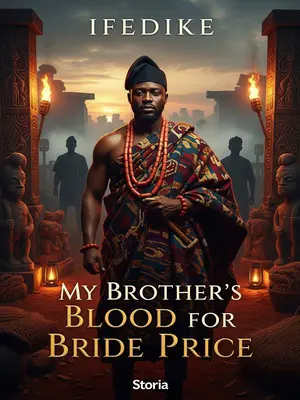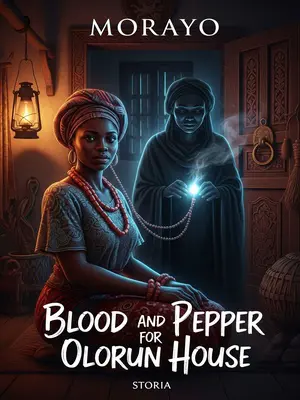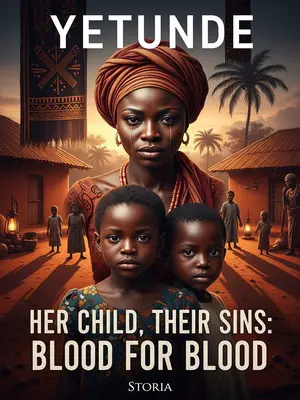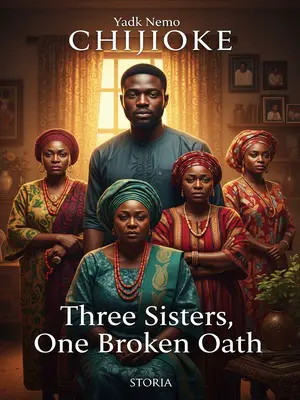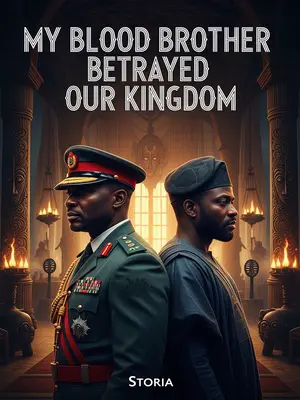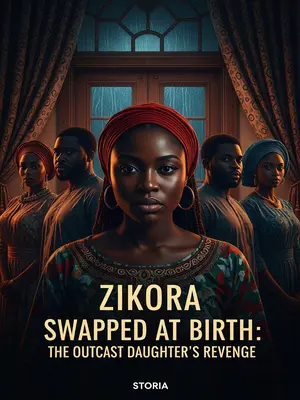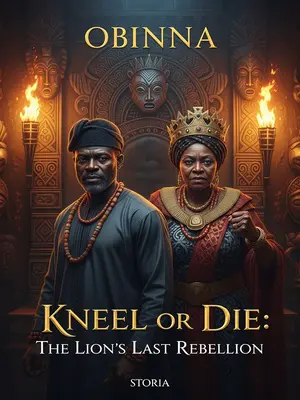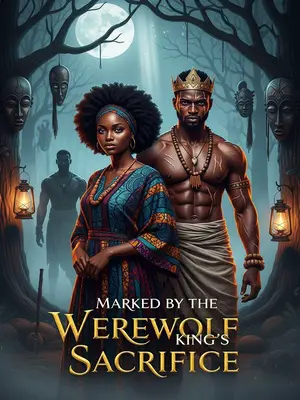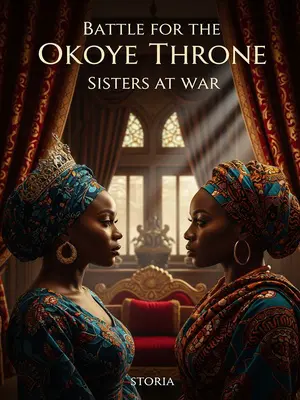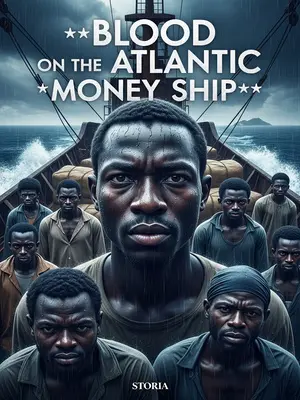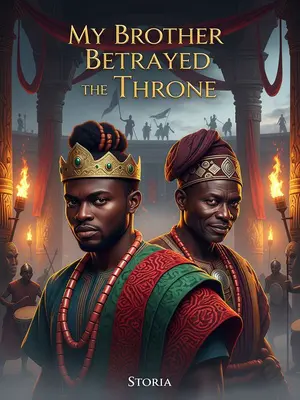Chapter 2: Street Debts
And that boy?
Right now, I’m sitting in the black internet café above the small convenience store.
The air inside is thick with the smell of sweat, instant noodles, and overheated electronics. NEPA light blinking on and off. The light flickers yellow, moths trapped between the bulbs and the dirty window panes. I keep my cap low, blending in with the shadows, but my heart beats with a purpose. This is the den where snakes gather.
This is where Professor Ifedike was robbed.
The locals still talk about that night, some shaking their heads, others pretending not to care. The shop owner downstairs, Mama Fatima, had tried to clean up the blood with hot water, muttering curses at whoever brought trouble to her doorstep.
Since he returned, he often worked late, trying to solve the factory’s technical problems as fast as possible. Whenever he got hungry, the factory manager would wake the canteen chef to make him food at midnight.
Professor Ifedike was tireless, always moving, sometimes working deep into the night, his small Tecno phone screen glowing in the dark. The old chef, Baba Sule, complained but always came with a steaming bowl of yam porridge if called. Yet, Ifedike was too gentle to trouble anyone unnecessarily.
But Professor Ifedike was considerate; he didn’t want to disturb anyone. So, when hunger struck at midnight, he didn’t call anybody. He’d come here himself, buy a bowl of instant noodles, borrow hot water, squat by the roadside to eat, then return to work.
Sometimes, the okada riders passing by would nod in respect, recognising him as the big man from the factory. But nobody expected what would happen next. In this country, even lions get bitten by ants.
Saidu was browsing the net here. When he saw Professor Ifedike paying with cash, he got wicked ideas and poured boiling instant noodles on him.
The moment sticks in my mind, like a bad dream. I imagine Ifedike’s hands trembling, his glasses fogged up, his scream echoing down the corridor as the hot broth hit his skin. Saidu and his crew laughing, thinking it was all one big joke.
This small boy had just been released from the police post. No money for internet, so he was just lounging on the chair, boasting to others how he beat up a middle-aged man.
He balanced for chair, legs open, like say na him get café. His mouth ran faster than his brain, painting himself as a street general, not a common thief.
The other area boys listened eagerly.
Their faces glowed with admiration, eyes wide, as if they were listening to tales of a hero, not a coward. One of them even offered him sachet water, treating him like a champion who had returned from battle.
They didn’t value school, but thought violence was something to boast about. I remembered my own school days, how some boys would rather risk a beating than carry their books. Now, these ones carried only pride and empty threats.
Beside him was a girl who said proudly, "Guy, I swear, I nearly die laugh that day. That uncle dey shake like leaf—e even dey beg my bro to go hustle instead of this one. My brother just slap am—pour the noodles for him head. The uncle begin cry and shout, even pull him cloth for road."
She spoke with a sharp tongue, her words tumbling out in a mixture of English and Pidgin. Her eyes danced as she narrated the event, clearly enjoying the attention of the group. Her braids swung as she laughed, mouth open wide in glee.
I frowned.
A deep line carved itself between my brows. The taste in my mouth turned sour. My fingers curled into fists. It was one thing for boys to misbehave, but another for girls to celebrate such wickedness.
Saidu na only pikin. No get any junior sister.
I know this for sure—because while he was busy bragging in the internet café, I had already entered his house and cut the tendons in his father’s hands and feet, crippling all four limbs.
I remember the room, the peeling paint, the scattered tools. His father’s cries still echo in my ears. I moved like a shadow, efficient, cold. After, I wiped my hands on his father’s dirty wrapper and looked around—no sign of any younger sister.
His father lay in his own blood, crying in pain, while I checked the old exercise book with family names inside to confirm Saidu was an only child.
I leafed through the tattered book, reading the names and dates. Only one child listed—Saidu. The truth sat heavy in my chest, the final confirmation I needed.
If a child is not well trained, it’s the father’s fault.
That saying rings true in our land. People point at stubborn children and shake their heads, always blaming the parents. “Na the father spoil am,” they’ll whisper, as if cursing the man to his grave.
When Saidu was taken to the police post, his father didn’t apologise. Instead, he insulted Professor Ifedike, blaming him for calling the police, saying they could have settled it quietly, but Professor Ifedike insisted on pressing charges and got his son expelled.
The father’s words still stung. He spat on the ground, his voice sharp, calling Ifedike names, refusing to beg or even look ashamed. The elders in the compound shook their heads, saying, "That man get stubborn spirit."
Professor Ifedike was the honoured guest jointly invited by our three hundred and fifty factories. To bully him is to insult the whole Okoli clan ancestral council.
It was more than just a personal slight—it was a slap to all of us, an insult that demanded an answer. My blood boiled at the thought, knowing that in our land, the guest is sacred.
As I wondered about the supposed younger sister, Saidu put his arm around the girl’s waist, kissed her ear, and asked, "You love your brother?"
His voice dripped with pride, as if claiming her in front of everyone made him a king. She giggled, rolling her eyes, but made no effort to pull away. Their flirtation was a public performance.
The girl rolled her eyes, but let him hold her waist, looking even prouder—as if being hugged by a big brother in front of everyone was a big achievement.
Her lips curled into a sly smile, daring anyone to challenge her place beside Saidu. The other girls watched, some with envy, others with disdain. Street relationships carry their own twisted hierarchy.
I understood: sworn siblings.
At this age, it’s common to just claim relatives anyhow.
Area boys and girls like to form crews, sometimes swearing brotherhood or sisterhood over bottles of cheap gin or sticks of suya. It’s all for show—loyalty that vanishes when trouble comes.
Someone asked, "Didn’t the uncle get burned when you poured the noodles on him?"
The room quieted a little. Even the boldest among them seemed curious about the real aftermath.
Saidu said, "He was lucky. He removed his clothes fast, so he wasn’t burnt, just turned red."
He spoke with bravado, waving his hands as if demonstrating. His story glossed over the pain, making light of what happened.
The girl sighed, "My brother was lucky too. If the guy had really been burnt, my brother wouldn’t have come out so fast."
She sounded half-proud, half-relieved. The others nodded, reassured that their "brother" had escaped harsher punishment.
My heart pained me.
A dull ache spread in my chest, a heaviness that made me want to shout at all of them. I bit my lip, holding back my anger. They spoke of violence as if it were a minor inconvenience.
Because I know Professor Ifedike was burned.
The image haunted me—his hands trembling, skin blistered, eyes wide with shock. The sight of his suffering clung to me, impossible to wash away.
When he was rushed to the hospital, the doctor said the burns were serious. We all begged him to get a medical injury assessment.
The waiting room was filled with our clan members, some pacing, others wringing their hands. The doctor, in his white coat, shook his head, saying the wounds could lead to lasting scars.
But Professor Ifedike refused. He told us not to worry, that it was nothing, that young people are just hot-headed.
He smiled through the pain, waving off our concerns. “Don’t let this matter grow bigger than it is,” he said softly. “A child that makes mistake today can still learn tomorrow.”
Because he insisted on not getting the injury assessment—wanting to give the boy a chance—Saidu came out so easily.
Ifedike’s mercy was his undoing. The law could not help him because he refused to press charges fully. Our elders shook their heads, saying, “Mercy no dey work for area boys.”
But who would have guessed, the first thing Saidu did after coming out was to seek revenge on him.
The streets remember kindness as weakness. When he should have lain low, Saidu only grew more reckless. It is always like that with people who never see consequence.
Now, Saidu was still bragging, "A few more days in cell is nothing. If you’ve never been inside, you’re not really part of the street."
He spoke with swagger, feet on the table, as if the police post was some kind of initiation ground, not a shameful stain on his life.
Anytime Saidu talked about being "inside," the students around him looked at him with one kind of respect.
I watched their faces, saw how their eyes widened, how they nodded and smiled. Some even leaned in, eager to ask questions about "cell life," hoping to borrow a bit of his street credibility.
As if he’d gone not to jail, but to University of Ibadan or Ahmadu Bello University.
One skinny boy even whistled, muttering, "If you never sleep for cell, you never see life." I shook my head, wondering what hope remained for the next generation.
Someone else asked, "You hit an adult. Didn’t he fight back?"
The room hushed for a second. Respect in this place was measured by violence, not knowledge.
Saidu just said, "Nobody has ever dared fight back when I hit them."
His tone was cold, final. The others laughed, slapping his back, treating him like a conqueror. I clenched my teeth, fighting the urge to stand up.
The girl laughed.
Her laughter was shrill, echoing off the cracked walls. It grated on my nerves, a mockery of everything good.
She narrated, excited, "It was so funny. That uncle was naked but still wore glasses. My brother slapped him again, and his glasses shifted. He adjusted them, shaking, and said, ‘Young man, don’t do this, it’s not right.’
"Then my brother slapped him again, and the glasses fell off. He held his face, crying in pain. Guess what he said?"
The story turned into a performance, her voice rising and falling, her face animated. She looked around, waiting for the group’s reaction.
A group of area boys shouted, "What did he say?"
Their voices overlapped, eager for the punchline, hungry for another laugh at someone else’s suffering.
The girl covered her mouth, giggling, "He just kept shouting, ‘Chei!’"
She nearly doubled over, barely able to control her amusement. The others joined in, some slapping their knees, others pounding the table.
The internet café burst into laughter.
Their voices filled the cramped room, shaking the rickety tables and sending a few empty bottles rolling to the floor. The laughter was loud and cruel, a sound that scraped my insides raw.
"Is there really someone who shouts ‘Chei’ when beaten?"
"I thought that only happened in Nollywood! Too funny."
They laughed harder, mimicking the cry. I felt bile rise in my throat.
Hearing them, I touched the bloodstained dagger in my pocket.
My fingers traced the cold metal, reassuring myself that justice was near. I inhaled deeply, steadying my mind for what was to come.
Is it funny?
Not at all.
A returning professor, scalded with instant noodles by a seventeen-year-old area boy, stripped and slapped in the street, crying out in pain.
It is not a Nollywood comedy, but a real man’s suffering, the shame of our whole community. The more I thought about it, the hotter my anger burned.
I don’t see anything funny. It’s like a knife turning in my heart.
The pain bite me for chest, like pepper. I clenched my jaw, wishing I could silence them all with a single shout, but I kept still, letting the hatred simmer.
Someone couldn’t hold back and said, "Brother Saidu, you beat someone and went to the police post. The teacher said you can’t come back to school. What will you do?"
The question hung in the air, half mocking, half curious. Some of them hoped he would admit fear, but Saidu only grinned.
Saidu shrugged, not bothered. "Then I won’t go to school. I’ve already talked to one big brother. If I don’t go to school, I’ll work as a promoter in his club. If I try, I can make over two hundred thousand a month."
He puffed out his chest, acting as if he had outsmarted the system. The others looked at each other, their minds racing with visions of easy money, music, and night life.
The area boys’ eyes widened, not because of the money, but in shock: "You really know people who work in clubs?"
One of them nudged his friend, whispering, “Na those club people dey get money pass now.” Envy crept into their voices, hope flickering that they too could find shortcuts.
Saidu clicked his tongue, enjoying their admiration.
He basked in their awe, a self-made king of nothing. The room seemed to tilt in his favour, as if the shadows themselves bowed to his arrogance.
I kept quiet, lit a cigarette, then left it on the table and continued playing my game.
The glow of the cigarette tip flickered orange, briefly lighting up the scowl on my face. I pretended to be absorbed in my computer screen, but every sense was alert, waiting for the next move.
The Benson & Hedges cigarettes I left on the table soon caught Saidu’s eye. Not just that—there were several bundles of naira notes under the pack.
The money was neatly arranged, almost too inviting. I watched Saidu out of the corner of my eye, waiting to see if greed would overcome caution. It didn’t take long.
I thought that, having just come out of the police post, Saidu might control himself. I wasn’t sure if this bait would catch him.
But he hadn’t learned sense.
Even a goat that gets flogged in the market will still return to the yam. Saidu’s pride blinded him. His fingers twitched as he weighed the risk, but his hunger for more overcame all reason.
He just walked over, picked up the Benson & Hedges, and took one out.
He did it with swagger, as if daring anyone to challenge him. Some of the boys whistled, others nudged each other, impressed by his boldness.
When I looked at him, he looked back at me with pride, bit the cigarette, and lit it.
Our eyes met for a moment. I saw the challenge in his gaze, the refusal to back down. But I also saw a flicker of uncertainty, a doubt he tried hard to hide.
Soon he saw the cash under the cigarettes.
His hand hovered for a second, then he slipped the cash into his pocket as if it belonged there all along. The other boys didn’t blink—they’d seen worse.
I held the dagger in my pocket with one hand and reached toward him with the other.
My movement was slow, deliberate, letting him see I wasn’t afraid. My other hand stayed on the table, fingers drumming a slow, steady rhythm.
At that moment, he suddenly turned and called out to the others, "We’re fighting this afternoon. Who’s joining?"
His voice rang with bravado, but there was a tremor in it. He wanted to remind everyone who the real boss was, to keep them on his side.
Everyone’s attention shifted.
The group buzzed with excitement, eager for any chance to flex their muscles and gain street glory. They forgot the money, the cigarettes, everything except the prospect of another fight.
I understood. He was warning me that he was about to call people for a fight, showing he was rugged, and that taking my cigarette was him giving me face, so I shouldn’t try anything.
In the street, these signals are loud and clear. He was staking his claim, marking territory. I read him like an open book.
Normally, people would hesitate in this kind of situation.
Most ordinary men would back down, fearing a mob. But I was not ordinary, and today was not for negotiation.
But these were just a bunch of area boys.
I sized up each one—skinny arms, loud mouths, empty bravado. My heart was cold. They were nothing to me.
The girl put on a careless voice and asked, "Brother, who are we fighting this time?"
She spoke as if asking about a school assignment. Her bravado matched Saidu’s, her tone full of the false courage that comes from never having faced real danger.
From her tone, it was clear she often fought with her sworn brother and felt proud of it.
Her eyes danced with excitement. She looked at her peers, daring anyone to challenge her. In her mind, she was already a legend.
Saidu grinned, "That old man from yesterday. He dared to call police on me and got me expelled from school. I won’t let him go. When the time comes, all of you follow me—everyone slap him once. You fit?"
He laid out the plan with all the confidence of a general. His boys roared their approval, eager for a piece of the action. The girl smacked her fist into her palm, nodding eagerly.
My face turned cold.
The muscles in my jaw clenched tight. My fingers itched to act, but I forced myself to wait, to let the plan unfold.
I knew he was talking about Professor Ifedike.
His name tasted bitter. I felt rage simmer beneath my skin, but my face remained stone, unreadable.
The group all acted like it was nothing, saying, "Let’s do am."
Their words bounced around the room, fueling each other’s ego. I heard nothing but the emptiness behind their voices.
I sighed.
The sound escaped me before I could stop it—a long, weary breath, heavy with disappointment and anger. In that moment, I knew there would be no mercy.
I stood up, walked to the café door, and locked it from inside.
The click of the lock was soft, almost drowned out by the noise of the group. But I heard it, and I saw the finality in my own reflection on the dusty glass door.
At first, I thought, every debt has a debtor. Today’s matter had nothing to do with these other area boys, so I wouldn’t involve them.
A small voice inside me pleaded for mercy. But as I watched their faces, twisted with anticipation for violence, that voice faded to silence.
But since all of them planned to harm Professor Ifedike, I wouldn’t let a nest of maggots go free.
Justice, today, would not be partial. Anyone who joined hands with evil would face the same fate.
This black internet café was on the third floor, in a small room, with the main power supply downstairs.
I memorised every corner—two computers by the window, a row of plastic chairs, one creaking ceiling fan. The only way out was now blocked by my own hands.
Meaning, these area boys were now locked in by me, no escape.
The air grew tense, though none of them realised it yet. I watched, silent, as the first beads of sweat began to form on Saidu’s brow.
They didn’t even notice what I’d done. Instead, they all brought out their phones to call friends, excitedly saying, "We’re going to fight! You dey come?"
Their fingers flew over cracked screens, voices rising with anticipation. Some already bragged about how many slaps they would deliver.
Even the girl was calling, proudly boasting, "Come with me this afternoon to beat up one old man."
Her words were loud, defiant. She tossed her head, as if daring anyone to call her bluff. The room buzzed with raw, misdirected energy.
When she said "beat up," she stressed it, as if she was about to do something heroic.
Her eyes sparkled with a strange pride. She looked at her friends, waiting for their approval, basking in her imagined glory.
Saidu picked up my Benson & Hedges again, shared them, and calmly pocketed the cash.
He passed cigarettes around like a king dispensing largesse. Some boys grinned, others bowed their heads slightly in thanks, eager to stay in his good books.
This guy just came out of police post, but didn’t learn anything.
The whole room smelled of smoke, sweat, and stale ambition. Saidu’s arrogance was thick, choking. I watched, letting the moment stretch.
Seeing me look at him, Saidu felt uneasy and asked with pride, "What are you looking at, old man? Not happy?"
His voice was sharp, defensive. But behind the bluster, I saw a flicker of fear—he sensed something off, but couldn’t name it.
I asked, "You’re robbing me, abi?"
My tone was flat, my eyes cold. The room grew quiet for a moment, everyone waiting for his response.
Saidu hissed, not bothered.
He flicked his hand in dismissal, the gesture casual. The others watched him, eager to see how he would handle the challenge.
He said, "Yes, I’m robbing you. What will you do? You know who I be? I’m Saidu from Government Secondary School."
He puffed out his chest, as if his school made him untouchable. Some of his boys whistled, others clapped.
When he mentioned his name, he was full of pride, as if expecting fear.
He looked at me with defiance, daring me to act. But I remained unmoved, my gaze steady.
But I just looked him in the eyes and said softly, "I never hear your name before. Just another nobody."
My words cut deeper than any slap. A few of the boys looked away, embarrassed for him. Saidu’s face darkened, his pride pricked.
Immediately, he got angry, grabbed an empty beer bottle from under the table, and walked toward me.
His grip was tight, knuckles white. The room tensed, the air thick with anticipation. Some of the younger boys edged back, not wanting to be too close if trouble started.
After all, there’s a convenience store downstairs—plenty snacks and drinks. Customers always leave rubbish here.
Empty bottles, biscuit wrappers, crushed cans—they littered the corners. Saidu picked up the bottle as if it were a club, ready to prove his power.
The other area boys didn’t stop him. Instead, they egged him on, crowding around me.
Their faces were masks of excitement, eyes wide with expectation. I saw the mob mentality take hold, the sense that together, they were invincible.
Saidu pressed the empty bottle to my head, acting like a big man, sneering, "When I break this on your head, you go like am."
His breath was hot and sour. He leaned in close, the bottle cold against my scalp. My heart rate stayed steady. I did not blink.
He turned to the others, "Tell them to come to the café now—we dey go beat person."
His words were a rallying cry. Phones came out again, fingers flying across screens. The group buzzed with new energy, the thrill of impending violence lighting up their faces.
The area boys all laughed, taking out their phones to call for backup.
Their laughter was sharp, cutting through the tension. Some boasted loudly, while others whispered names into their phones, hungry for more numbers on their side.
I took out my phone too.
The movement caught Saidu’s eye. He sneered, thinking I was about to beg for help. The others watched, some smirking.
Saidu thought I was calling for help. He pressed the bottle to my chest and said coldly, "Calling for backup? Let’s see who brings more people."
His chest puffed out, confidence flooding his words. But his eyes darted, uncertainty flickering in their depths.
I looked at him, didn’t call, but sent a voice message: "I dey Fatima’s convenience store."
My voice was calm, unhurried. The room watched, confused, waiting to see what would happen next.
He grabbed my phone, but when he saw the message, he started laughing: "Too funny, I thought you were calling for help. See who he messaged."
He waved the phone at the others, mocking. The group burst into fresh laughter, some doubling over, others slapping their thighs.
The message was sent to my second uncle.
Saidu laughed, "You old like this, you dey call your second uncle for help when you wan chop beating? Don’t tell me your second uncle is some area boss. How old is he?"
The others hooted, jeering. One boy even mimed a cane, pretending to spank me like a child.
The area boys all laughed along.
Their voices bounced around the cramped room. I felt the weight of their mockery, but my heart was steady, my resolve unbroken.
"Now you dey call your second uncle. You go soon call your papa and mama too?"
"So old, still calling your parents when you dey trouble?"
"Abeg, call your mama make she come entertain us."
"Which gang your second uncle belong to?"
The insults kept coming, each one more childish than the last. I let them wash over me, unmoved.
I said quietly, "My second uncle is the chairman of the Okoli clan ancestral council."
My words were low, each syllable heavy with meaning. The room grew quiet, confusion clouding their faces.
Saidu looked confused: "What? Which gang be that?"
He frowned, scratching his head. The others looked at him, unsure what to make of it.
As he finished talking, the power in the room went off.
The darkness come sharp, thick like ogbono soup. The computers died with a groan, the air conditioning stopped. For a second, no one moved.
All the computers died at once. The sudden darkness shocked them.
A few boys cursed, their voices shaky. Someone reached for their phone torch, but their hands trembled.
The small area girl muttered, "Why light go off? Is it everywhere?"
Her voice was small, uncertain. She tiptoed to the window, peering through the dusty glass, trying to make sense of the growing dread.
She went to the window, looked out, and gasped, "Wetin dey happen? The road outside don block."
Her gasp was sharp, the panic in her tone spreading through the room like cold water.
Everyone rushed to the window.
The room swayed with bodies, each person shoving to get a better view. I stayed back, watching the confusion unfold.
On the road, four excavators blocked the entrance, yellow tape everywhere.
The machines sat like sentinels, engines silent, their arms raised to the sky. Yellow tape fluttered in the breeze. From above, it looked like a barrier even spirits couldn’t cross.
It looked like construction, but after parking the excavators, the workers just waka go.
No one lingered, no noise, just a sudden emptiness. The street was sealed, and the world grew smaller.
With four excavators blocking the road, even police can’t enter. Even tow truck no fit help.
The realisation hit slowly, like harmattan dust settling over everything. There was no escape—today, justice had come.
While they stared outside, I kicked the table.
The sound exploded in the silence. The table crashed, sending keyboards and monitors flying, blocking the doorway completely.
The computers and table scattered, blocking the doorway—the only way out.
The exit was gone, replaced by chaos. The boys turned, shock written all over their faces.
They were confused. Saidu shouted, "You dey mad?"
His voice broke, the first crack in his confidence. The others clustered behind him, unsure whether to fight or flee.
I asked, "Wetin dey funny about beating a good person?"
My voice was cold, deadly. I stared at each of them, daring anyone to answer.
Someone insulted me, "Ode," and walked up, saying, "Wetin you dey talk?"
His bravado was forced. Sweat glistened on his forehead, fear flickering in his eyes.
I said, "I dey ask you—wetin dey funny about beating an honest, decent intellectual? If your parents no fit train you, I go help."
The words cut through the bravado, laying bare their shame. Some boys shuffled their feet, eyes darting to the floor.
He laughed.
The sound was hollow, echoing in the tense air. He pushed me, trying to show he wasn’t afraid.
He pushed my chest and said, "You dey try fear me? You know who we be?"
He puffed out his chest, but his hands shook. His friends watched, waiting for someone else to make the next move.
I shook my head, "Nobody cares about the names of society’s maggots."
The insult landed hard. The boy’s face twisted in anger, but fear won over pride.
As I spoke, I brought out the dagger from my pocket.
The blade glinted in the faint light, sharp and clean, promising pain. Gasps echoed around the room.
The blade, once bloody, was now wiped clean on my clothes, shining cold.
It caught the eye of every person present, freezing them in place. The room seemed to shrink, the air growing colder.
Some were afraid. Some weren’t.
The bravest among them tried to square their shoulders, but their eyes betrayed them.
Like the area boy in front of me.
His lip curled in defiance, but his voice trembled. He was too far in to back out now.
He sneered, "Oh, you wan fear us with knife? Oya, I go let you cut me today."
He spat on the floor, daring me to act. His friends murmured approval, but no one stepped closer.
He lowered his head, pointed to his scalp: "Cut here. If you no cut, you be my dog."
His bravado teetered on desperation, pride clinging to the last shred of courage.
I laughed.
The sound was low, chilling. It rolled through the room like thunder on a rainy night. Some boys flinched.
Area boys are funny.
They mistake noise for strength, pride for invincibility. The real world doesn’t work that way.
I said, "First, dagger no dey chop. Second, human skull too strong. I no go cut your head."
The words fell flat, confusion flickering in their eyes. Some chuckled nervously, thinking I was making a joke.
Everyone thought I was scared and started laughing.
Their laughter was thin, brittle, hiding the unease growing in their bellies.
The guy felt he had shown enough courage. He raised his chin, pointed at my nose, and said, "I give you chance, but you no fit. You—"
Before he could finish, I moved.
My body reacted before thought, swift as lightning. He barely had time to blink.
I kicked his knee, made him kneel, hands on the table.
His body crumpled, the shock of pain twisting his face. His pride melted, replaced by terror.
I raised my knife and drove the blade straight through his palm, pinning it to the table.
The knife enter with one kpokpo sound, blood just rush. His scream was a wounded animal’s cry.
Screams filled the café.
The chorus of terror rose, some boys stumbling back, others frozen in shock. The room vibrated with panic.
Everyone was shocked. The once-proud area boy howled like a goat.
His bravado vanished, tears running down his cheeks. Some boys covered their faces, unable to watch.
I said coldly, "Dagger is for stabbing."
My voice was iron, unyielding. The lesson was clear—pain for pain, blood for blood.
Blood gushed from his hand. He held it in fear, but the bleeding didn’t stop. As blood poured between his fingers, his pride disappeared, replaced by sobbing: "Bro, abeg, I dey sorry, calm down."
His voice cracked, his eyes wide with terror. He begged like a child, his former bravado gone with the wind.
One half-grown area boy who bullied honest people, now shaking like a child before a real hard man.
The others watched, fear dawning in their eyes. Some considered running, but the blocked door reminded them there was no escape.
I sighed, "Seems nothing to show you’re better than a maggot."
My words were heavy, my disappointment genuine. They had failed every test of manhood worth respecting.
I pulled the knife out. As I did, the blade sliced across his wrist, cutting his tendon.
The movement was swift, deliberate. His scream pierced the air, higher and louder than before.
He shook, fell to the ground, clutching his wrist, crying.
Blood pooled at his feet, staining the floor. His sobs filled the silence, a chilling reminder of what pride can cost.
The whole place went quiet.
The tension was thick, suffocating. Even the street noise below faded into nothing.
I walked toward them. Now, fear filled all their faces.
They shrank back, pressing themselves against the walls, desperate to avoid my gaze.
I asked, "E funny? Looking at your faces, I think it’s funny too."
I let the words hang, daring any of them to laugh again. None did. Their eyes shone with terror, their bodies trembling.
Saidu still held the empty beer bottle, but now he couldn’t fight or run.
His fingers trembled, sweat pouring down his face. His eyes darted, looking for a way out that didn’t exist.
Everyone panicked, pushing him forward, but after two steps, his legs failed and he couldn’t even stand.
The pressure from his boys was gone. He was alone now, a coward exposed.
We were only on the third floor.
The thought of escape flashed across his face. But he knew a jump might mean broken bones, or worse.
For Saidu, jumping out the window might have been his best option.
He hesitated, torn between fear and pride. The window beckoned, but so did the shame of running in front of his crew.
But at this age, saving face is everything—especially in front of his followers.
Peer pressure can be deadlier than any weapon. For these boys, respect is life and death.
I know that many young people pay the price in society because they can’t drop their pride.
I’ve seen it before—at burials, at hospital bedsides, at police stations. The lesson is always the same, but nobody wants to learn.
Saidu tried to act calm, "Bro, no vex. We wrong too. Knife no dey solve anything."
His voice quivered, the fear finally breaking through. He tried to sound wise, but his words rang hollow.
I sneered.
My lips curled, contempt dripping from every syllable. I had no patience left for his empty talk.
He was talking tough, but clearly backing down.
His eyes darted, searching for an ally. But no one met his gaze. The room was a graveyard of bravado.
Saidu said, "Bro, where you from? I sabi plenty big men. Maybe we dey the same side."
He tried to bargain, offering connections he thought would save him. I let him speak, knowing none of it mattered.
I replied calmly, "Okoli clan ancestral council."
My voice was soft but final. The words hung in the air, heavy as thunder.
He panicked: "I no understand. Never hear that gang before. You sabi Brother Chuks from Unity Secondary? Or the Seven Lions of Palm Grove Club?"
He rattled off names, desperation seeping into every word. His bluster was gone, replaced by naked fear.
I shook my head. "Enough talk. Come here. I go cut your hand and foot tendons—like I did to your papa—and we go end am here."
The sentence sent a shiver through the room. The others shuffled back, unwilling to share his fate.
Saidu was shocked: "Wetin happen to my papa?"
His voice was small, uncertain. The reality of the situation finally dawned on him.
I took a severed finger from my pocket and threw it in front of him.
The finger landed with a thud, rolling across the floor. The gold ring glinted in the half-light, the word ‘Ego’ shining out.
Na heavy gold ring, the kind wey only big men dey wear for burial ceremony.
It was Saidu’s father’s finger.
The message was clear—no mercy, no escape. Even the strongest can be brought low.
At once, everyone except Saidu turned white, screaming in fear.
Some tried to run, others sank to the floor, sobbing. The courage that filled the room earlier vanished like mist in the sun.
The area girl stammered, "Brother, na you he dey find. Run!"
Her voice was hoarse, thick with panic. She pushed Saidu, desperate to save herself.
Saidu turned and looked at her with anger.
His pride wounded, he lashed out, trying to find someone to blame. But no one would stand with him now.
The girl panicked, "Brother, na only you fit handle am!"
She clung to him, eyes wild. But he shook her off, his fear turning to anger.
Saidu slapped her, shouting, "Why you no go yourself?"
His palm cracked against her cheek, the sound echoing in the silent room. She stumbled back, eyes wide with shock.
She covered her face, shocked, staring at him.
Her tears spilled over, smudging her eyeliner. She saw the truth—there was no family, no loyalty, only survival.
Suddenly, she shouted, "I no be your sister again! I dey go!"
Her voice rose in defiance, trembling with fear and anger. She turned to run, but the way was blocked.
She covered her face and tried to pass me, but I held her arm.
My grip was firm, unyielding. She froze, terror flooding her face. Her breath came in short gasps.
She started crying and begging, "Uncle abeg, no vex. I no do anything. Na play we dey play."
Her voice shook, words tumbling out. She tried to drop to her knees, but I kept her upright.
I asked, "When he robbed me, you just dey look and laugh, abi?"
My question cut through her pleas. Her mouth opened, but no sound came. The truth weighed on her, heavy as a curse.
She froze, unable to answer.
Her body trembled, eyes wide with fear and regret. The room seemed to close in around her.
I pressed the tip of my knife to her eye and said coldly, "Since you like to watch rubbish, you no need these eyes."
She whimpered, legs weak, sobbing: "Abeg, make I no blind. I swear, I no go follow bad thing again."
Even the other boys, cowed and silent, watched in horror, realising that street games have real consequences when true justice comes calling.
In this city, even laughter get price. Tonight, everybody go pay.
